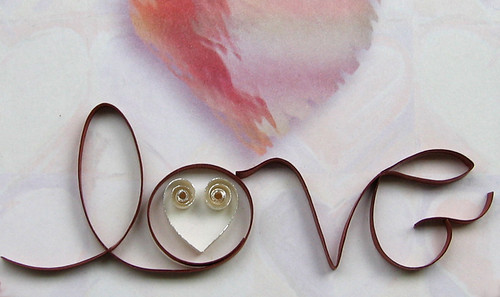Here are some thoughts I jotted down while in the lettering zone - hope you'll find them useful:
1. Lightweight cardstock is ideal for on-edge letters, but because I have more colors of quilling paper than card, I usually use that. Any brand will do provided two strips are glued together to double the strength. The extra thickness, plus glue, makes the paper strong enough to stand on edge.
2. To glue two strips together, spread glue down the length of one strip with your fingertips. When the strip is thoroughly coated, place the second strip on top. Gently wipe away any glue that seeps out along the edges by running a damp cloth down the strip a few times. Set the strip aside and don't even think about rolling it until the glue has dried completely. Trust me on that; the paper will just buckle if it's damp. Major frustration ensues!
3. If cutting your own strips from a sheet of paper or cardstock, it's important to slice with the grain so the coils roll smoothly. You may need to roll a strip cut from each direction of the sheet to determine which way the grain runs; usually it's the length. (hmm, that doesn't sound clear; try it and I think you'll see what I mean.)
4. Sketch the design of your letters, or find a font online and print out the word in whatever size you like. You can shape your letters right on top of the pattern.
5. To curve the letters, run the strip along the side of your needle tool (or round toothpick, paper piercing tool, stiff wire - whatever you have on hand) as if you were curling paper ribbon.
6. When the letters are ready to be placed on the background paper, spread a thin layer of glue on a non-stick surface. I use a Styrofoam tray or the lid of a plastic container. Holding the letter(s) with tweezers, touch the underside to the glue and place the letters directly on the paper. Try not to slide them into place, as this will leave a snail trail of glue. Even though glue dries clear, the shine will be obvious.
I'll have another quilled Rennie Mackintosh-inspired card coming up soon... am a bit obsessed with his work at the moment. There will be more on-edge script examples later in the week too, so stay tuned.
If you'd like to receive my occasional All Things Paper newsletter that features posts like this one, sign up here. Quilling and other paper craft supplies I recommend can be found in my Amazon shop.







